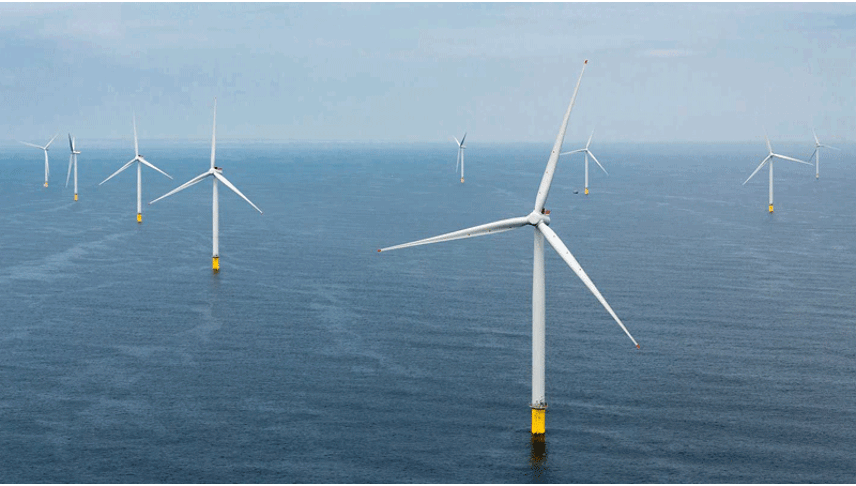Register for free and continue reading
Join our growing army of changemakers and get unlimited access to our premium content

Pictured: Race Bank offshore wind farm. Image: Orsted
The Department for Energy Security and Net-Zero (DESNZ) has today (17 April) opened a new consultation on what it describes as a “major” reform to the Contracts for Difference (CfD) auction process.
The CfD auction scheme has been running since 2014 and provides renewable electricity generators with a long-term contract with the Government. It guarantees a minimum price for their electricity, while also shielding consumers from high prices by setting a maximum price.
To date, contracts for low-carbon projects totalling 26.1GW have been awarded through the CfD. The scheme is credited with bringing offshore wind unit prices down by around 70% between 2015 and 2022.
Due to a significant reform in 2022, CfD rounds are now being held annually, whereas they were initially held once every two years. The rounds have also had their budgets increased, with a £205m year-on-year uplift this year.
DESNZ is now proposing a further reform. Until 22 May, it is seeking views on reviewing applications not only on their ability to deliver low-cost clean energy generation, but also their provision of wider socio-economic benefits, described by the Department as “non-price factors”.
A consultation is being held on what could constitute a “non-price factor” and the extent to which these factors could determine an application’s outcome. Potential factors floated by DESNZ include the ability to deliver local and sustainable supply chains, the ability to open up markets for the latest innovations and whether developers have strong plans to address the skills gap in the renewables sector.
PwC estimated last year that the UK’s energy sector is likely to have a gap of around 200,000 skilled workers by 2030, due to planned retirements and poor planning for upskilling and reskilling for growing sectors such as offshore wind and low-carbon hydrogen.
DESNZ is also considering whether the provision of grid flexibility could be considered a “non-price factor”. The CfD has previously been criticised for failing to support energy storage projects and other assets and projects that can unlock flexibility, given how crucial this will be to maintaining energy security as more intermittent generation comes online.
Energy Security and Net-Zero Minister Graham Stuart said the reform could “ultimately make for a stronger sector and help our economy to grow”.
A further consultation will follow this one once specific factors have been identified. Any reform of the CfD scheme will be undertaken through the Review of Energy Market Arrangements (REMA), which is badged as the biggest shake-up to energy market design in a generation. Initial REMA consultations opened last summer and the progress of the review has doubtless been slowed by two changes in Prime Minister since its launch.
Green economy reaction
Commenting on the consultation, Energy UK’s deputy director for advocacy Adam Berman said: “The CfD programme has played a key role in ensuring the UK’s position as a global leader in low-carbon technologies. But factors such as inflation, commodity price increases, and pressure from international competition mean that the UK will have to continue working hard to pull in the investment required to reach our net-zero and energy security goals.
“We welcome the Government’s ambition to build on the success of the CfD programme by recognising that the cost of delivering new renewables projects has risen significantly over recent months.
“If designed appropriately, the inclusion of new factors in the CfD could improve investment certainty for low carbon projects, boosting energy security as well as ensuring that all parts of the UK benefit from the jobs, skills, and supply chain opportunities these multi-billion-pound investments bring.”
Outgoing offshore wind champion Tim Pick said: “As noted in my recent report, price-only CfD auctions have created a strong driver for innovation to drive down costs, but there is a need in the current climate to consider how to better develop new supply chains and associated jobs.
“The current global context arguably provides the justification for considering a more nuanced approach as part of a wider package of measures, especially as we seek to seize a first-mover advantage in the deployment of floating offshore wind technology at scale.”
Pick’s report, published earlier this month, warned that the UK will not meet its 2030 ambition to host 50GW of offshore wind capacity without several major changes, with accelerated investment and streamlined processes for grid infrastructure being top the most pressing.
The Association for Renewable Energy and Clean Technology’s head of power and flexibility Mark Sommerfeld said the consultation is “welcome”.
“The inclusion of non-price factors into the CfD could also be the basis for rewarding a range of further benefits provided by different low carbon technologies, including balancing service to the electricity grid, improving efficiencies and further emission reduction services. The REA looks forward to working with government to ensure the design of these proposals leads to an attractive investment environment that helps to speed up the UK energy transition.”


Please login or Register to leave a comment.